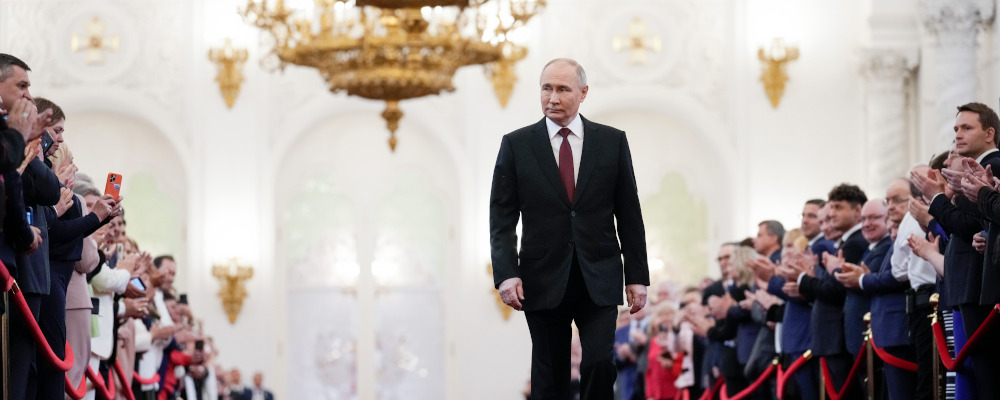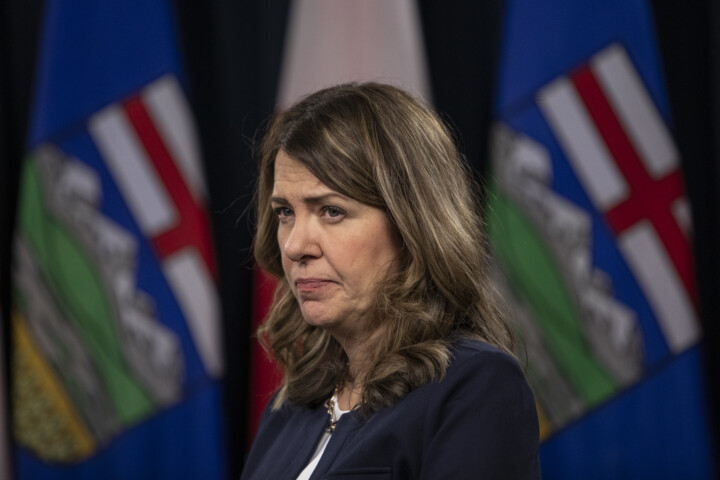In May 1896, Nicholas II was crowned the last emperor of Russia in Moscow. An elaborately choreographed and opulent display hosted in a Kremlin cathedral affirmed that he was divinely ordained with absolute, autocratic power. Part man and part god. From that moment on, Nicholas was considered all but omnipotent.
Yet the celebration around the tsar was simultaneously marked by tragedy and superstition. During the post-coronation festivities, almost 1,300 people were killed in a crowd crush just a few kilometres from the Kremlin in Khodynka. Contemporary observers interpreted the tragedy as a dangerous omen for Nicholas II. The new tsar’s reign, it was claimed, would be cursed. Twenty-two years later, the tsar and his family were murdered by Bolshevik revolutionaries: the godlike leader was brought back down to earth. Then buried in it.
A century on, Vladimir Putin’s recent inauguration for his fifth term as president last week took place with all the pomp and circumstance of Nicholas’ coronation. The president-elect strode through the now familiar Rococo halls, flanked by guards in elaborate dress uniforms, as his elites looked on approvingly. Putin took the same presidential oath and affirmed again that he would lead Russia for yet another term of office. All seemed to be just as it ever was under Russia’s leader, who has now been in continuous positions of power leading the country for nearly 25 years.

Yet in a worrying new turn, the language and ritual around the president’s latest—and inevitable—coronation suggest that Putin is now positioning himself as a ruler imbued with the same omnipotence afforded to his tsarist predecessors. However, there is as yet no indication that the public is willing to overthrow the 21st-century tsar as they did to his 20th-century forebear.
After taking the presidential oath, Putin put the “special military operation”—as he still calls the war against Ukraine—front and centre in his inauguration speech. Praising veterans and victims of the war, he explained that a “difficult pivotal period” today—presumably indicating the economic travails and large death toll of the present—would lead to the accomplishment of “everything we have planned for the long term.” Under his guardianship, the newly crowned president claimed, 21st-century Russia would reach the “glorious” and “insurmountable heights” of its “thousand-year-long history.”
Putin then retired to the Kremlin’s Annunciation Cathedral, just yards from the site of the last tsar’s coronation, for a thanksgiving service led by the Russian Orthodox Patriarch, Kirill. At the last presidential inauguration in 2018, Kirill was far more restrained, describing Putin merely as “a person devoted to the Fatherland” and to spiritual leadership. This time, Putin was bestowed with extraordinary and, in the history of the post-Soviet state, unparalleled blessings. Kirill, Russia’s most important religious figure, expressed a wish that the leader would reign until “the end of the century.” The Russian word vek—century—is imbued with religious connotations, suggesting equally an entire epoch or historical era as it does one hundred years. Putin, Kirill seemed to suggest, would no longer be bound by earthly constraints. Kirill then hoped aloud that Putin would become a new Alexander Nevsky, the mythologized and beatified Muscovite ruler who defeated a force of Catholic invaders—purportedly saving the nation—in the 13th century. In recent years, Putin has increasingly likened himself to such mythical military leaders. In 2022, the president compared himself to Peter the Great, lauded by Russians as their greatest military leader and the founder of the modern state. Just like Peter, Putin contended, he was claiming Russia’s “historical lands” through war.
Both Kirill and Putin choose their public comments very carefully. The comparisons to Nevsky and Peter, and the suggestion that Putin might reign for an entire religious-historical epoch, are not an accident. Rather, they signal a new era in Putin’s public image: one in which he is to become a sort of demi-God, leading his flock and his country into an era of unparalleled greatness. One in which the distinctions between the sacred and the secular have all but evaporated.
Putin, of course, came to power at the turn of the century promising a new era of national strength after the humiliating economic and social collapse of the 1990s, when Russia defaulted on its national debt and lawless mafia gangs ran riot.
Yet, despite claims to the contrary, back then Putin was never at the centre of a cult of personality. He was certainly elevated to the status of extraordinary, over-achieving everyman: a teetotaler where Russian men drowned in alcoholism; a muscular judoka and hockey player who could beat the pros; a talented horse rider and submarine archeologist par excellence. The eroticized object of fawning pop and rap songs, Putin was turned into a consumer product: somebody—something—to be desired and imitated. But, this younger Putin was closer to a retail politician—a man who took the tough decisions to advocate for Russia—than a god. Any Russian man could aspire to be like Putin.
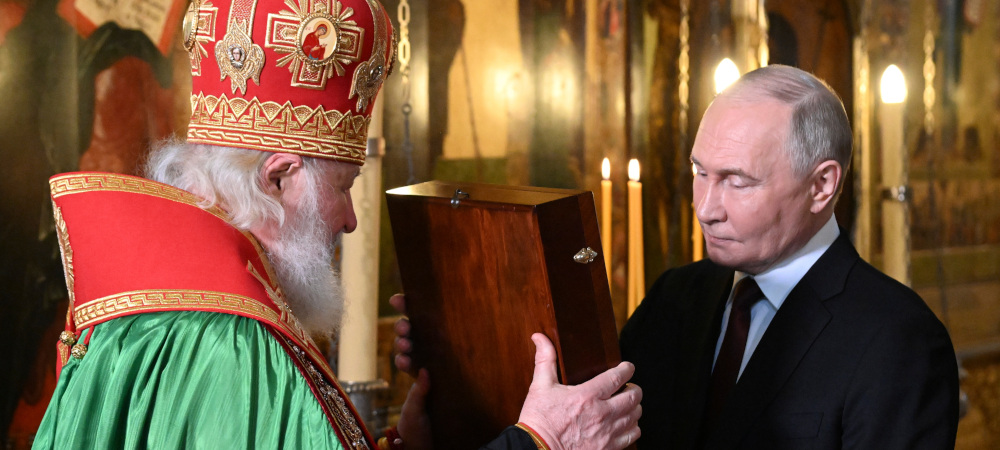
But over the last half-decade, that consumerist Putin has gradually receded from view. At first, as he visibly aged, it seemed that the leader was striving to emulate another post-Soviet leader, the Kazakh autocrat Nursultan Nazarbayev, in painting himself as an avuncular grandfather of the nation. Some even saw it as a possible prelude to him stepping back from the forefront of public view. The all-action, macho Putin of the 2000s transformed into a sedate figure who kept his appearances to the Kremlin, in the presidential office, and to key rituals like the annual Victory Day parade. This second era of Putinism seemed to cast the leader as a steady figure—the only figure—with the wisdom to guide the ship of the nation through turbulent times. A sage leader, perhaps, but not a saint.
But as religious and mythical nationalist descriptions of Putin have increasingly emanated from the Kremlin and Orthodox Church, increasing subsections of Russia’s patriotic public have embraced the president as a living god. Today, in social media groups that give news updates on Ukraine, ordinary users today regularly interject with commentary that sanctifies the leader. “God is with us,” they might claim to hundreds of thousands of members, or “Putin is sent by God.” The latter-day tsar is, if the likes of the most extreme thinkers such as Alexander Dugin are to be believed, leading a religious, apocalyptic crusade. When these Russians hear Patriarch Kirill’s comments, they do not react with mockery or disbelief. They are the prime targets for a state-led campaign to sanctify Putin.
While the tragedy of Khodynka marred Nicholas II’s reign from the start, the enormous Russian death toll—50,000 confirmed dead, and likely many more—sustained by Putin’s army at the Ukrainian front is instead seen as necessary suffering in order to win a much greater, historic victory.
Russia, its leader, and its public are now at a dangerous inflection point. Putin has never so concertedly attempted to deify himself. When previous dictators have tried to do so, mass hysteria, ideology triumphant over reason, and terrible crimes justified in the name of state religion have followed. Many Russians may remain skeptical of the absurdities of Putinist rhetoric, but there is every chance a core of zealous peers could yet drive Putin—and their country—onto as-yet-unimagined atrocities in Ukraine and beyond.
Recommended for You
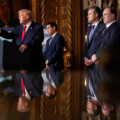
Trump’s new ‘Donroe Doctrine’ leaves no room for Carney’s China reset
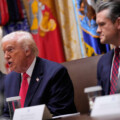
‘Public finances are a mess’: How America’s debt crisis is fuelling its aggressive foreign policy
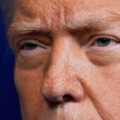
‘This would be crossing a Rubicon’: Why Donald Trump has his sights set on Greenland
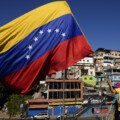
Why Trump’s Venezuela gambit won’t break Canadian oil

